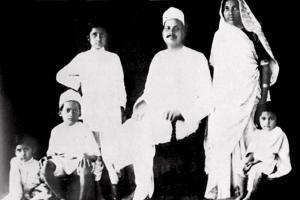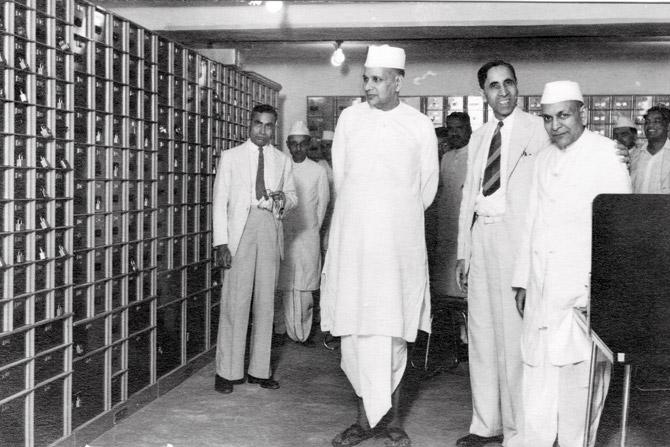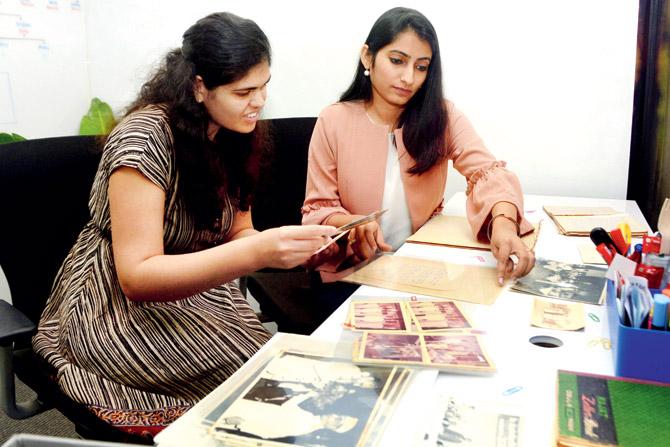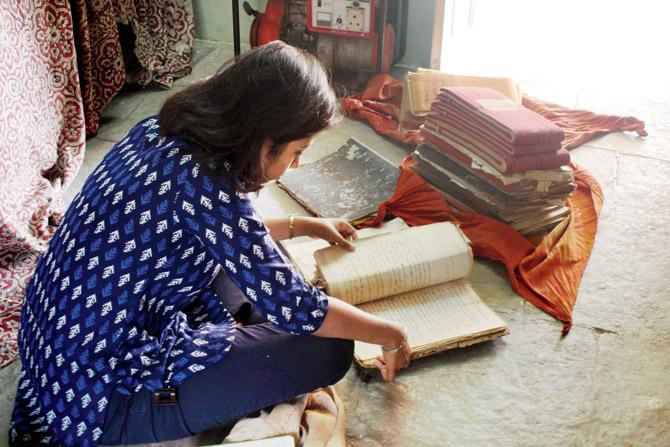How a city-based heritage management team is helping business families engage with the story of their becoming, through a collection of their company's oral and historical archives

Jamnalal with his family. Pics Courtesy/Bajaj Heritage Cell
Jamnalal Bajaj, who founded the Bajaj Group of Industries in 1926, wore many hats in the decades of running his enterprise. For those who knew him personally, he was a nationalist and Gandhian supporter first, and then a businessman. But Jamnalal was also a meticulous documentarian, recording his every single move - from the time he woke up to the last person he spoke with, before sleeping - in the many diaries, he had accumulated during his lifetime. There was also an assortment of letters he wrote and received from family, politicians and business partners, all of which were later published into several books, called the Patra Vyavhar series.

Jamnalal Bajaj on a visit to Mukand Iron & Steel, Lahore — a company that he took over along with Jeewanlal Motichand on MK Gandhi's advice.
ADVERTISEMENT
For archivists Sanghamitra Chatterjee, 35, and Deepti Anand, 23, who run Past Perfect, a Mumbai-based heritage management company, Jamnalal, thus, became an effortless entry point into tracing the Bajaj family's business history. Since June last year, the duo has been invested in collecting and archiving material, in an attempt to piece together the stories of the men, who spearheaded the making of Bajaj. The mandate was straightforward, says Anand. "We were asked to focus on key personalities from the family."

(From right) Sanghamitra Chatterjee and Deepti Anand of Past Perfect have been recording business archives for the last two years. Pic/Sneha Kharabe
As frontrunners in this one-of-its-kind exercise of documenting the business heritage of families, Chatterjee and Anand have faced their own set of challenges. The Bajaj family was a good start, because of the volume of literature available on Jamnalal - some of the original diaries were stored in the basement of Bajaj Bhavan in Nariman Point. They were not so lucky when it came to tracing the story of the Apurva Natvar Parikh Group. From a humble kirana store in Ahmedabad, started by Natvar Chotalal Parikh in the 1930s, the company has today, branched out to offer specialised services in transportation, lifting, shipping, logistics and warehousing. But for Natvar's grandchildren, the trajectory of this growth of the family business, has forever, remained a mystery. It's here that legacy archiving comes into play.

Trisha George of Past Perfect surveying old files and khatas from early 1900s found in the Bajaj family's ancestral home at Wardha
Tracing the business story
Chatterjee, a history student from Ruia College, who worked with the Godrej Archives for over nine years, decided to start her own company, Past Perfect, two years ago, after having freelanced on a similar business archive project with Cipla. She found a great partner in Anand, who graduated from St Xavier's College, and is equally passionate about archiving. The work was an extension of what Chatterjee did at Godrej, which established its own repository for the company's archives in 2006. "Usually, the story of how the founder family starts their business is well documented. But, thereafter what happens, is often not valued. For instance, the story of how you build you distribution network and HR system, how you marketed the company, or how the design of your product evolved etc, is not recorded," says Chatterjee, adding that this becomes crucial to understanding a company's business history.
According to Chatterjee, in India, the need to preserve one's business heritage mostly kicks in 50 to 60 years after an enterprise is formally established, or once the company has completed important benchmarks, like the centenary celebration. By then, however, important people, involved in the establishment of the enterprise, have long disappeared. "And, so you have lost out on valuable experiential history," says Anand. This makes their task, doubly challenging.
As a starting point, the duo and its 10-member strong staff, go about collecting the founder family's letters, annual reports, photographs, product catalogues and brochures, among other correspondences. "We also do oral history interviews of employees, across the hierarchy, who've been with the company for over 25 years, and other stakeholders, like dealers and partners, associated with the company, who have interesting nuggets to share," says Chatterjee. Once the task of collecting the material ends, work on cataloguing begins. "This the most time-consuming, but in order to service various requests related to accessing the archives, it is important to catalogue them," she adds.
How archiving helps
Anand points out again how Rohan and Anuja Parikh of Apurva Natvar Parikh Group, were absolutely clueless of how and when the company moved into logistics. By the 1940s, their grandfather, Natvar, had moved from the kirana set-up to supplying manure and feeds, before shifting into the business of supplying labour force to warehouses in Bombay. The launch of PL-480 programme between India and the US through which rice from the US was to be supplied via 600 ships, saw Natvar diversify into the logistic business, as he bagged the contract for handling and transporting food shipments from docks to warehouses across Mumbai.
The family was able to articulate these shifts only after engaging in an in-depth archival inquiry into their group's history, says Chatterjee. "Internally, when an archive truthfully captures the entire political, economic and social history of the business, and not just its evolutionary story, the company's various departments could use it to sensitise its employees about the values and ethics that it stands for. This history could be used by the marketing and sales departments, to prop up the brand value of the company," says Chatterjee, adding that the material can also be accessed by academicians and scholars, for their personal study.
Anand adds that tracing the trajectory of the company can help the current crop of stakeholders learn important lessons from their founder members, which in turn can be used to establish or reimagine their identity again. One interesting example is Jamnanlal's sons Kamalnayan and Ramkrishna Bajaj, who represent two different aspects of their father. Chatterjee says that while Kamalnayan was more business-driven, Ramkrishna had a natural leaning towards initiating projects "beyond profits". The company today is a sum total of what its founding members stood for.
Catch up on all the latest Mumbai news, crime news, current affairs, and also a complete guide on Mumbai from food to things to do and events across the city here. Also download the new mid-day Android and iOS apps to get latest updates
 Subscribe today by clicking the link and stay updated with the latest news!" Click here!
Subscribe today by clicking the link and stay updated with the latest news!" Click here!







